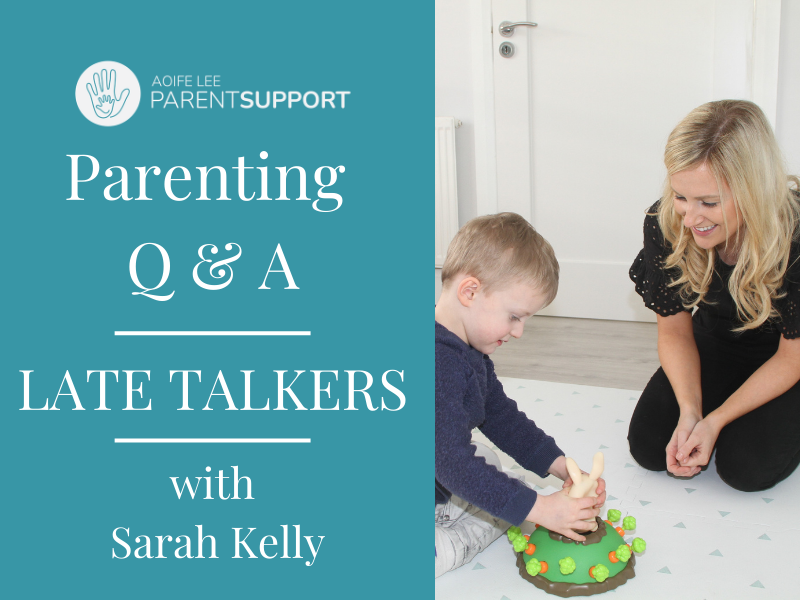Parenting Q & A | How to support your child if they need help with their speech with Sarah Kelly
Speech milestones and late talkers are common concerns for many parents and caregivers. When I asked Sarah Kelly, Senior Speech & Language Therapist of SpeakEasy SLT and mum of two boys, if she would like to contribute to my expert Q&A series and she said yes, I was delighted. Sarah has advised me previously in relation to a concern I had for my youngest son’s speech, so I trust her professional opinion and advice without hesitation. Practical and with lots of reassurance.
Sarah runs her own private practice SpeakEasy SLT and shop PlayEasy. Sarah has extensive experience working with children with a wide range of speech, language, and communication difficulties. First and foremost, Sarah is a mum of two boys, Finn, and Ollie. Ollie was born 9 weeks prematurely, so she has experienced first-hand the emotion, stress and worry of a child being developmentally delayed. She can empathise and understand the impact this has on the whole family.
To make it real and informative as possible for my readers I asked Sarah what she found are the most frequently asked question in terms of speech and language? Sarah confirmed that parents often worry when their child’s speech is more delayed or not as established as peers or family of a similar age.
During our conversation I asked Sarah, is it common for a child to be a late talker and if so what age qualifies as a ‘late talker’? We spoke about why some children take longer than others to talk and what parents can do to support their child before they consider Speech & Language Therapy and more.
Frequently asked questions about Late Talkers
Is it common for a small child to be a ‘late talker’?
In 18 –24 month old children, it is estimated that 12-15% are late talkers.
What age does a child qualify as a late talker?
A late talker is described as a child who is aged 18 - 30 months with a reduced vocabulary despite meeting all other milestones (receptive language, play, social & motor skills). The milestones in vocabulary we expect are: 18 months = 10 words, 24 months = 50 words and 36 months = 250 words. It is important to mention that the milestone means that 90% of children will achieve this and the average child will often have more words. Therefore, if your child isn’t meeting the milestone it is advised to seek help.
Why do some children take longer than others to talk?
There isn’t one specific reason we can attribute to late talkers. However, there are some factors that can contribute e.g. genetics (boys are more at risk than girls) a family history of speech and language difficulties, prematurity, and hearing difficulties / recurring ear infections. One thing I can reassure you is that parents DO NOT cause speech and language delays.
Is there anything a parent can do to support a late talker before they consider Speech & Language Therapy?
Some of my top tips:
Be mindful of questions – life is not a test and questions can be difficult for young children to respond to. Instead, model language for them. Imagine in any given situation if your child had a word or two what might they say? “Say what he would if he could.”
Follow their interests – children are more likely to learn language about something they’re interested in.
Forget about academic language (numbers and letters) for an early communicator and instead give them vocabulary so that they can express their needs and wants.
Keep a note of the words your child uses consistently and appropriately in context. We often forget how many words our kids have, keeping this note helps you keep on track.
You will also see lots more advice in my highlight saved on Instagram (@speakeasyslt_ie) “top tips.”
Check out Sarah’s recent blog on Developing Early Language; here
Do late talkers need speech therapy and if so when should you start looking at an assessment of speech?
The wait and see approach are outdated and the evidence shows the benefits of early intervention for late talkers. If your child is not meeting the milestones I mentioned earlier, then seek help. We know that 70-80% of children with expressive language delay (no delays in understanding or social use of language) will catch up. However, we cannot predict if a child will fall into this category or the 20-30% that won’t catch up.
Is there a connection between a child being bilingual and delayed speech?
Great question and one that comes up frequently. Parent’s fear this and will often drop their home language to develop English. Bilingualism does not cause language delay; however, a child can have an inherent language delay. When counting words, it is good to know that if your child has the word “ball” in English and another language then that is counted as 2 words. In bilingualism families, we never advise speaking English only. However, my advice to you is not to code-switch. Code-switching is combining two languages in the one phrase or sentence. Children often do this and that’s ok, but you should speak a sentence in one language only. Otherwise, it can be very confusing. Giving your child a solid foundation in their home language, makes it easier for them to map English on.
Hanen.org is a great website for parents all about language development and late talkers.
As parents, we want the best for our children, sometimes a little reassurance and direction can help significantly, it’s natural to worry so if your mind has been eased somewhat because of Sarah’s professional advice – I am delighted!
If you are feeling overwhelmed or facing challenges with your children, I am here to help, I offer tailored 1 to 1 parent support sessions. Get in touch with me today at aoife@parentsupport.ie or if you are interested in creating a happier and calmer home I offer a Video Based Positive Parenting eLearning Course.

